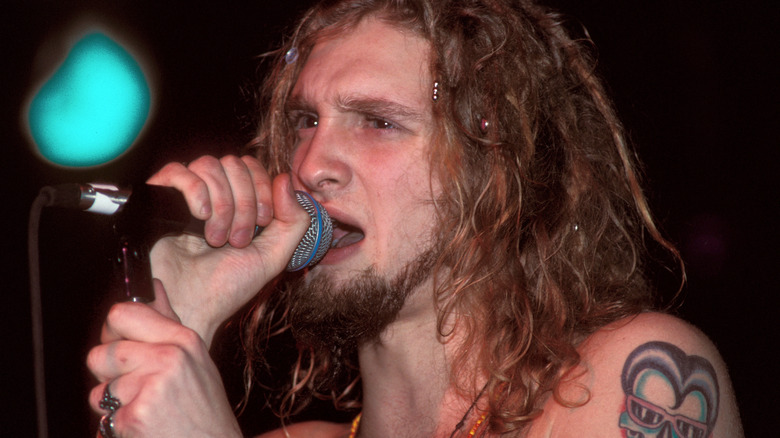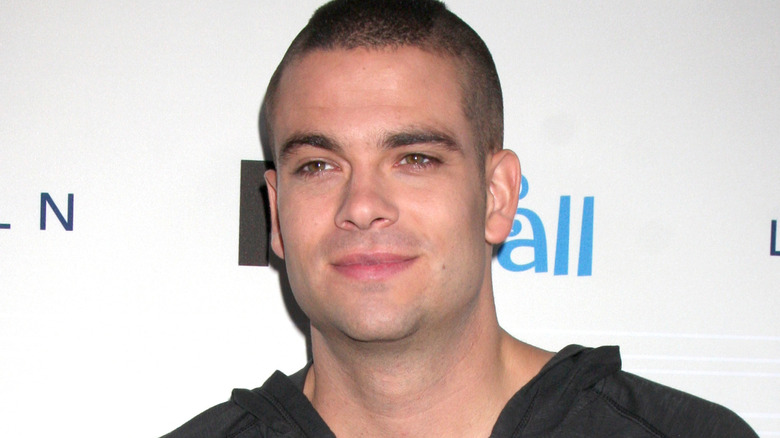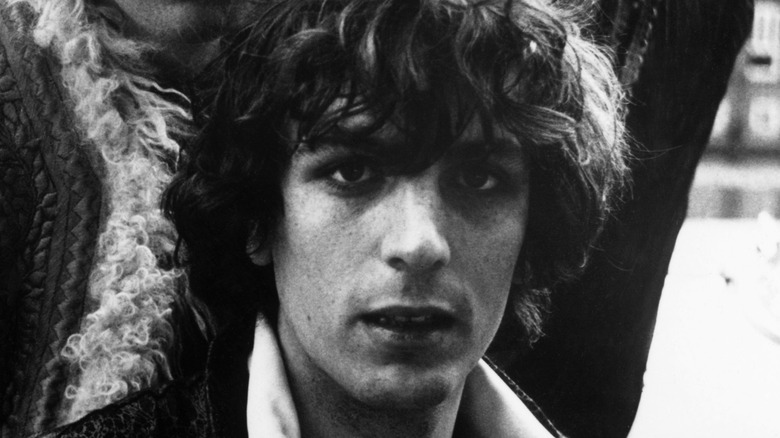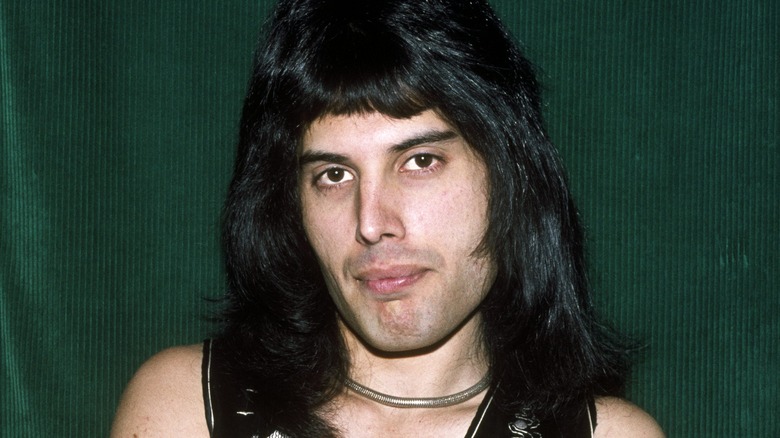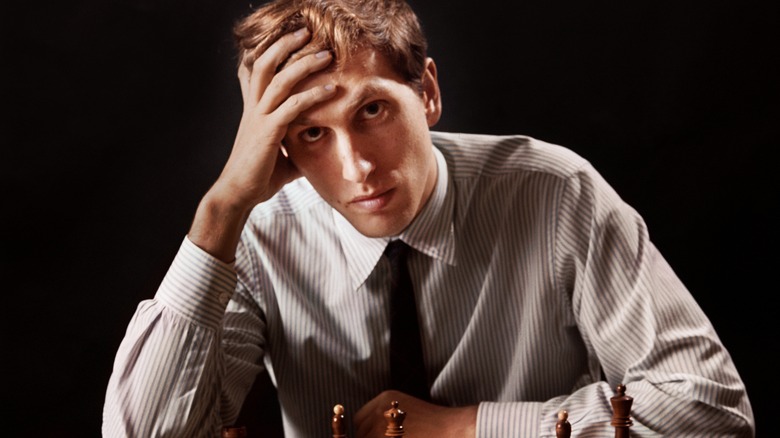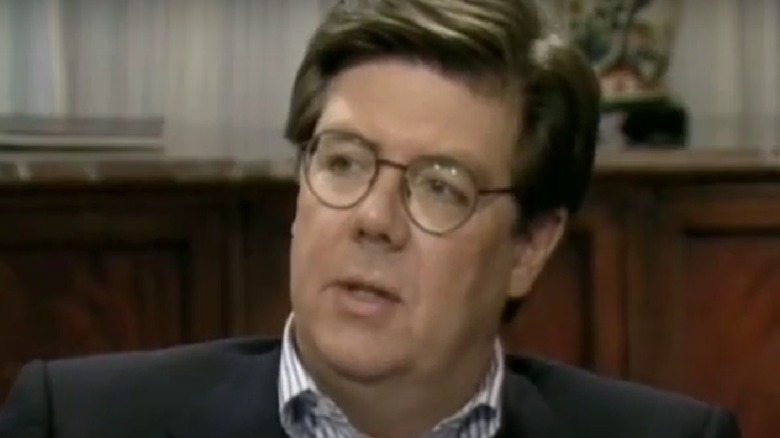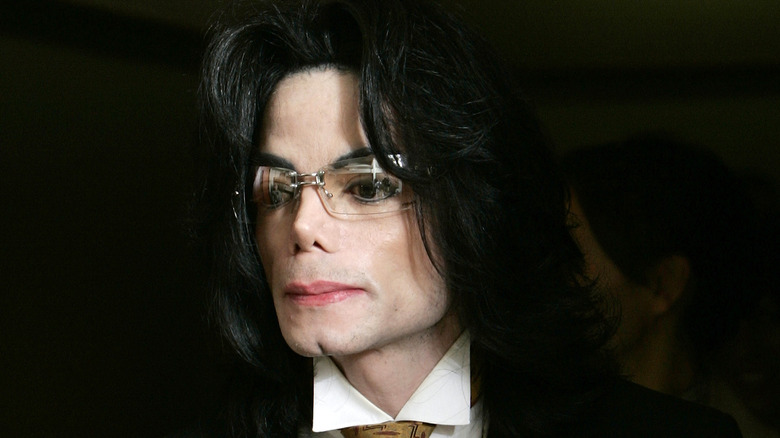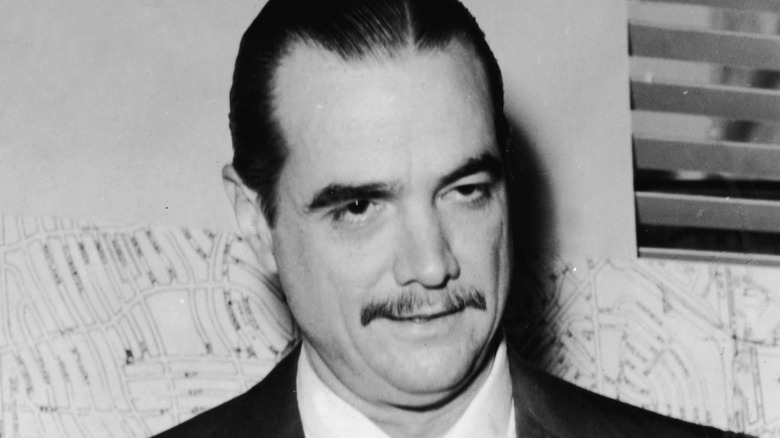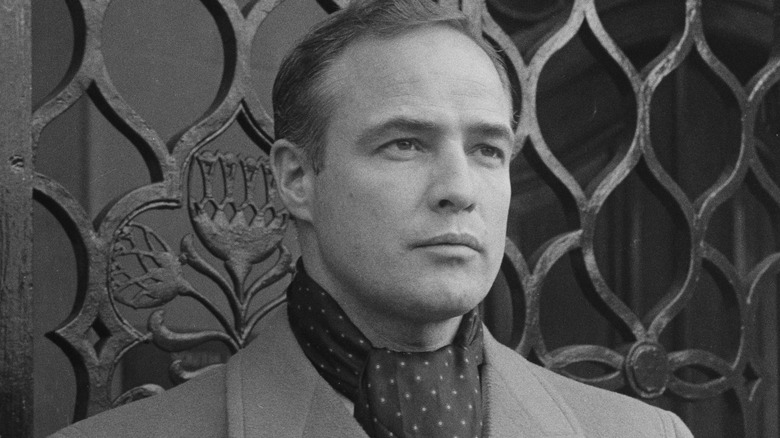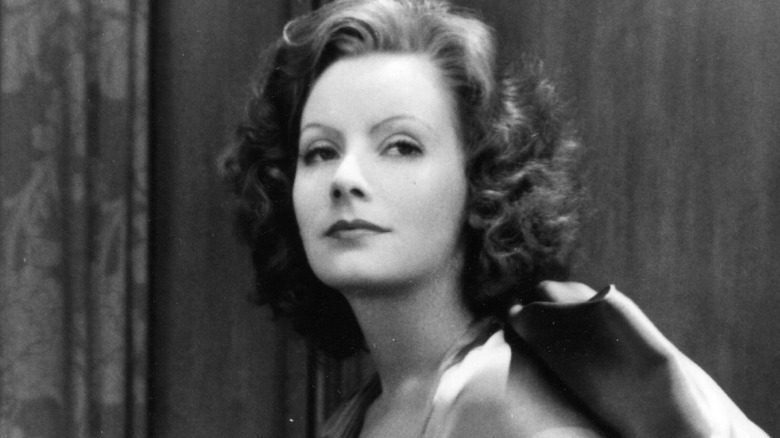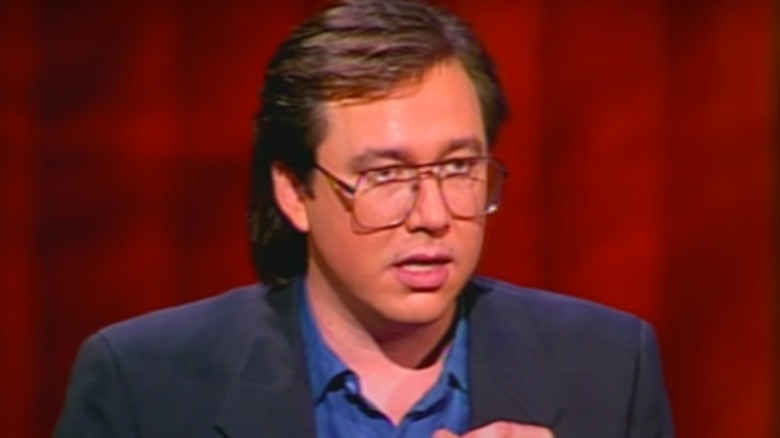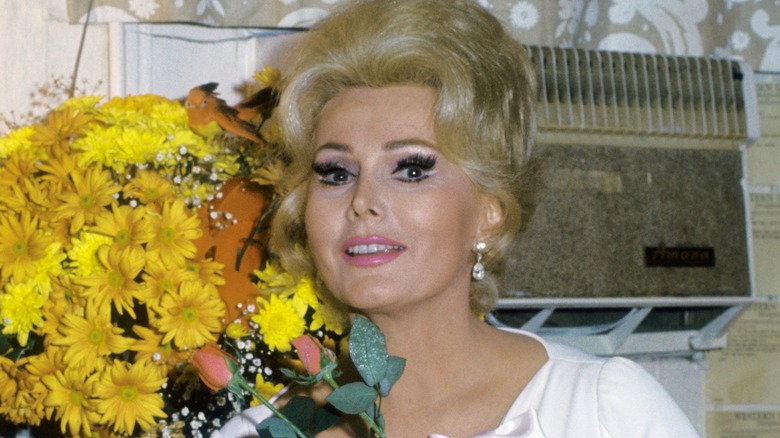Celebs Who Went Into Hiding Before Their Deaths
The following article contains references to suicide, child abuse, mental health conditions, and addiction.
When an individual reaches unprecedented levels of fame and fortune, there is often a rather misguided assumption that their entire life is a public free-for-all. In part, the advent of social media has led many fans to expect access to the highs and lows of a celeb's life. While we might all love the juicy oversharing that comes from celebrity culture, such as Rihanna spilling the tea about Jay-Z on Twitter, this trend of oversharing may ultimately have detrimental effects on those with fame. This scrutiny and expectation has led many famous people to retreat from the spotlight and opt for a more guarded existence.
For instance, when Chadwick Boseman died of cancer in 2020, his fans were shocked that, for four whole years, his condition was never made public. While Boseman kept working amid his illness, however, for other celebs, a terminal diagnosis or deteriorating health has led them to hide away outright.
Stars will go into hiding for numerous, complex reasons, and some have remained reclusive up until their deaths. From shocking scandals to secret illnesses, these celebs decided it was best to keep the lowest of low profiles during their final moments.
A tragic end for Layne Staley
Layne Staley was the frontman of the iconic grunge band, Alice In Chains. Toward the end of his all-too-brief life, he became a recluse. Refusing to speak to those who loved him, Staley's friends and family had no idea that he was slowly wasting away in his apartment.
According to Far Out Magazine, Staley went into hiding during his final years and neglected himself to an extreme extent, which resulted in a bout of gangrene. In his heartbreaking final interview, he acknowledged that his days were numbered. "I know I'm near death," Staley admitted (via Far Out Magazine). "I did crack and heroin for years. I never wanted to end my life this way. I know I have no chance. It's too late." The musician also divulged that he couldn't keep food down and was suffering from incontinence.
When Staley was found dead on April 5, 2002, the devastating extent of his reclusiveness was revealed. Due to years of being hidden away from the world, no one found his body until it had begun to decompose, so the 34-year-old had to be identified through postmortem tests, per Billboard. The musician's friend, Tim Branom, reflected on Staley's last years in a Facebook post (via Alternative Nation). "In the end, almost no one could contact Layne. He wouldn't answer the door or take calls. ... He weighed 80-some pounds and his health was deteriorating."
If you or anyone you know is struggling with addiction issues, help is available. Visit the Substance Abuse and Mental Health Services Administration website or contact SAMHSA's National Helpline at 1-800-662-HELP (4357).
Mark Salling shielded himself amid a sullied reputation
Much has been made of the so-called "Glee curse" that points to the succession of cast member deaths. After leading man Cory Monteith died in 2013, Mark Salling was the second "Glee" star to pass away. The actor died by suicide in 2018, aged 35. At the time of his demise, Salling faced several years in prison after pleading guilty to possessing over 50,000 child pornography images. Following his plea deal, the actor reportedly went into hiding as he awaited his incarceration.
"He was close with his family, but as far as friends go — he maybe had those acquaintances he communicated with every once in a while, but he pretty much isolated himself. He didn't really have a relationship with too many people," a source told People.
An ex-friend told Us Magazine that Salling had been leading a solitary life since being exposed as a pedophile. That isolation may not have been self-imposed, however, due to his pals wanting to cut all ties with him following the sordid child pornography revelations. "He was in a dark place. He was very lonely. He was very depressed," his former friend explained. "He was going to prison soon. Whoever was in his life pretty much cut him off." The source added that Salling "lost all his true friendships" and "He moved away from Los Angeles after the news broke because he wanted to just get out."
If you or someone you know may be the victim of child abuse, please contact the Childhelp National Child Abuse Hotline at 1-800-4-A-Child (1-800-422-4453) or contact their live chat services.
If you or anyone you know is having suicidal thoughts, please call the National Suicide Prevention Lifeline at 1-800-273-TALK (8255).
Syd Barrett died as an enigma
Pink Floyd was one of the most influential bands of all time, and it paved the way for the numerous prog rock acts that followed. But before the addition of David Gilmour in 1967, the band exhibited a decidedly different sound. Original frontman Syd Barrett created Pink Floyd as a psychedelic group and used lyrics steeped in his childhood regression. After some erratic behavior, however, Barrett was expelled from the band in 1968 and went into hiding. According to The Guardian, "he moved into the basement of his mother Winifred's house in Cambridge where he boarded up the windows to keep out the eyes of the press and fans." He died in that very home in 2006, aged 60.
In 1975, Barrett briefly emerged from hiding to check in on his former bandmates recording their classic album "Wish You Were Here," though no one recognized him because he looked so different. "I had no idea who it was," drummer Nick Mason recalled during the documentary "The Story of Wish You Were Here." But Barrett's recess from isolation was fleeting, and he soon returned to his mother's house. In 2001, Roger Waters told The Guardian that he never spoke to him after 1975.
Speaking a few years before Barrett's death, Barrett's nephew, Ian, explained that he struggled in social situations and would rather people left him alone in peace. "He doesn't enjoy socializing and finds it very disturbing to be around large groups of people."
If you or someone you know is struggling with mental health, please contact the Crisis Text Line by texting HOME to 741741, call the National Alliance on Mental Illness helpline at 1-800-950-NAMI (6264), or visit the National Institute of Mental Health website.
AIDS stigma left Freddie Mercury in hiding
Once the frontman of one of the biggest bands on the planet, Queen superstar Freddie Mercury spent his final years in isolation, largely due to the bigotry surrounding AIDS, with which Mercury was diagnosed in 1987. He died in 1991 at the age of 45, just one day after publicly revealing his diagnosis.
According to The Guardian, Mercury spent the last two years of his life hidden away in his London mansion. Although he made a rare, final public appearance at the BRIT Awards in 1990, where the dying singer barely uttered a word, Mercury retreated from public life thereafter.
His bandmate and friend Brian May explained that press intrusion into Mercury's private life led to his need for insulation. "Particularly towards the end of his life he was pursued by the press and curious people," May told The Telegraph. "He just wanted peace and quiet, to be able to get on with what he did." Tellingly, Mercury recorded music toward the end of his life, singing, "I don't want pity. Just a safe place to hide," via The Telegraph.
Moreover, Mercury didn't want the public to see the once-effervescent star in the throes of the deadly illness. "On one occasion he turned to me and said sadly, 'To think I used to be so handsome.' I got up and had to leave the room," his best friend Mary Austin recounted to the Daily Mail. "It was too upsetting."
Bobby Fischer went from chess genius to recluse
Chess grandmaster Bobby Fischer was a puzzle-solving savant, though he himself was something of a puzzle. As noted by Australian news agency ABC, he "spent his last years as a fugitive from US authorities." Following an illegal 1992 chess match in then-Yugoslavia, which was under sanction by the U.S. government, Fischer was a wanted man, per The New York Times. Subsequently, he spent the rest of his life in hiding as he attempted to evade capture by the FBI.
Fischer's legacy was sullied by his reputation as a controversy magnet. In a bizarre move, he briefly emerged from hiding following 9/11 to praise the horrific tragedy, ostracizing the once-venerated champ even further. As chronicled by The Atlantic, Fischer spent his final years peddling racist theories and surrounding himself with Nazi memorabilia. Some even said that "he slept with a picture of Adolf Hitler hanging over his bed." Despite being of Jewish origin, Fischer erroneously claimed that his downfall was the result of a Jewish conspiracy.
In his book "When I Stop Talking, You'll Know I'm Dead: Useful Stories from a Persuasive Man," film producer Jerry Weintraub recalls once attempting to track Fischer down, to which he was told, "You can't just track down Bobby Fischer. He doesn't talk to anyone, doesn't go anywhere. He is locked off from the world." By 2005, Fischer was in hiding in Iceland, per the Los Angeles Times, where he died three years later, aged 64.
If you or a loved one has experienced a hate crime, contact the VictimConnect Hotline by phone at 1-855-4-VICTIM or by chat for more information or assistance in locating services to help. If you or a loved one are in immediate danger, call 911.
John Hughes disappeared from the public before he died
Famed for directing iconic '80s films such as "The Breakfast Club" and "Sixteen Candles," John Hughes was characterized by his secretive persona. Despite being a Hollywood bigshot, however, Hughes largely kept to himself.
The Atlantic argued that "Home Alone," which Hughes wrote at the tail end of his '80s heyday, spelled the beginning of the end of his career. But Hughes' son, John Hughes III, gave a different account of his dad's decision to shy away from Hollywood. As he told Vanity Fair, his father didn't have many friends, having been irreparably devastated by the death of his close pal and collaborator John Candy in 1994, which was a major catalyst for his decision to stop directing films. Instead, Hughes decided to focus on his family life. "I think he looked at family as a sort of wall," his son explained. "It gave him a sort of protection for not getting drawn out of the house. We were his social activity."
In 2008, the Huffington Post described Hughes as "something of a Howard Hughes-style recluse — he doesn't have an agent, doesn't give interviews and lives far away, somewhere in Chicago's sprawling North Shore suburbs where most of his films were set." So, when Hughes died suddenly in 2009, aged just 59, friends poignantly recalled to film critic Roger Ebert that the late director was "a recluse who disappeared somewhere in Illinois."
Michael Jackson died secluded from the world
It seems nearly impossible to fathom that the King of Pop died shielded from the rest of the world, but, according to those closest to him, Michael Jackson died a virtual recluse. Journalist Steve Knopper's book, "MJ: The Genius of Michael Jackson," details the superstar's secluded final days, with The New Yorker describing it as Jackson's tale from "unequalled fame and riches ... to a deformed, reclusive, and obsessive middle age."
The King of Pop's seclusion was precipitated by the many child abuse allegations he faced. Although he was acquitted on all charges, he largely disappeared from public life following his infamous trial, per Australian news agency ABC. Despite dying in isolation, Jackson had high hopes for a comeback with his "This is it!" tour. However, as The Independent noted, he only agreed to do the tour because he had no other option, facing financial ruin in the aftermath of the trial and various other legal issues.
"The vultures who were pulling his strings somehow managed to put this concert extravaganza together behind his back, then presented it to him as a fait accompli," a source told the Daily Mail. "The money was just unbelievable and all his financial people were telling him he was facing bankruptcy. But Michael still resisted. He didn't think he could pull it off." Of course, the concert sadly never materialized, as Jackson died before it could begin. He was 50 years old.
If you or someone you know may be the victim of child abuse, please contact the Childhelp National Child Abuse Hotline at 1-800-4-A-Child (1-800-422-4453) or contact their live chat services.
A debilitating illness led Howard Hughes to hide away
Billionaire Howard Hughes was a renowned innovator who experienced lifelong mental illness at a time when mental health conditions were stigmatized and poorly understood. Hughes' reclusive nature has been frequently parodied, notably in "The Simpsons" episode "$pringfield (or, How I Learned to Stop Worrying and Love Legalized Gambling)," whereby Mr. Burns slowly becomes an obsessive germaphobe, but the truth is, Hughes' health was no laughing matter.
In recent years, the magnate's illness has been characterized as obsessive compulsive disorder, which led to him shielding himself from the outside world. "He didn't believe germs could come from him, just from the outside," Raymond D. Fowler, who conducted a psychological autopsy on Hughes, explained to the American Psychological Association. "He was convinced that he was going to be contaminated from the outside."
Time detailed the detrimental effects of Hughes' reclusiveness, taken from James Phelan's seminal novel about the billionaire's final years, "Howard Hughes: The Hidden Years." His once-pristine appearance had been reduced to an unkempt beard that "hung to his waist; his hair reached mid-back," while "his fingernails were two inches long, and his toenails grew and grew until they resembled yellow corkscrews." This neglect bore its toll on his physical health, too, with Phelan pointing out that Hughes "walked with a pronounced stoop." According to The New York Times, his reclusiveness was so severe that, at the time of the 70-year-old's death in 1976, he "had shrunk from 175 pounds to 87."
If you or someone you know is struggling with mental health, please contact the Crisis Text Line by texting HOME to 741741, call the National Alliance on Mental Illness helpline at 1-800-950-NAMI (6264), or visit the National Institute of Mental Health website.
Following his diagnosis, David Bowie hid himself from the public
The world was shocked when pioneering rock star David Bowie died of cancer in 2016, aged 69. Other than those closest to the musician, no one knew Bowie was gravely ill. Always one with reclusive tendencies, Bowie hid himself from the public before he died. His final interview was nine whole years before his death, when he spoke about his unforgettable guest slot on Ricky Gervais' sitcom "Extras." Thereafter, as his friend Tony Visconti told The Times, he refused to ever be interviewed again and kept a very low profile.
As Rolling Stone noted, "He grew so secretive that he chided one of his closest collaborators, Tony Visconti, for revealing that they watched British comedy during studio breaks." During his final years, he also hid his identity from the public, albeit through comical means, with William Boyd writing in The Guardian that Bowie often went out in public carrying a Greek newspaper to make onlookers think that he was "just some Greek guy who looks like him."
Before making one final — and rare — public appearance in December 2015, Bowie was never seen again. "I don't find it strange he kept his illness so private," Francis Whately reflected, per The Guardian. "He'd had his life picked over for 40 years and he thought he had said everything he wanted to say, there was nothing more."
The mysterious final years of Marlon Brando
Regarded as one of the greatest actors of all time, Marlon Brando went from highly publicized superstar to recluse towards the end of his life. As such, much of Brando's passing is shrouded in mystery. As director Stevan Riley told the Los Angeles Times, the actor was a "prisoner of his own fame. ... He was trapped."
As reported by The Telegraph, Brando avoided social interactions during the last few years of his life and would only communicate with friends "over the phone from the safety of his Mulholland retreat." There had long been an enigmatic aura surrounding the star, who retreated from public life following the tragic death of his daughter Cheyenne in 1995, which was precipitated by Brando's son killing Cheyenne's allegedly abusive boyfriend.
Unlike many other Hollywood A-listers, Brando decided to live a quiet life. The Los Angeles Times noted: "For much of his life Brando was a recluse, staying at an island he bought in Tahiti or in his hilltop home on Mulholland Drive." And, as his health deteriorated, Brando retreated further, not wanting to upset his friends and family with news of his imminent demise. "I remember that last conversation I had with him," his daughter Rebecca recounted to GQ. "It was just a few weeks before he died. He didn't want everyone ... to know how bad he was. We expressed our love for one another and that was it." Brando died in 2004, aged 80.
Greta Garbo swapped Hollywood for a solitary life
Famed for the quote, "I want to be alone," Hollywood icon Greta Garbo told a friend, via Life, that she actually meant something entirely different. "I never said, 'I want to be alone.' I only said, 'I want to be let alone!' There is all the difference." Indeed, Garbo was famous for her reclusive persona, having given up her Hollywood career at the age of 35 to lead a solitary life.
Auction house Sotheby's sold a collection of letters written by Garbo in which she expressed her unrelenting sadness and loneliness. "I am almost always alone and talk to myself. I drive to the beach and take walks and that's always marvellous [sic]. But that's it," she wrote in one letter. Moreover, her struggles within Hollywood shone a light on her motivation for quitting the biz. "It's been a difficult time, it all went wrong."
Of Garbo's last days, the Los Angeles Times wrote that she was "living a ghostly existence, shuttling between her home and the hospital and bidding farewell to close friends as she neared death." Garbo's friend, Raymond Daum, told the outlet that in the lead-up to her death in 1990, the 84-year-old was "retreating more and more" and "she didn't see many people." But perhaps that was how Garbo ultimately wanted to spend her last days, having once told Daum that she had an aversion to social interaction: "I can't help it. I was born that way."
Bill Hicks spent his final weeks reading Lord of the Rings
Cult comic Bill Hicks' influence on the comedy landscape is undeniable. His acerbic brand of politically charged stand-up has inspired countless satirically minded comedians since, from David Cross to the intellectual British musings of Russell Brand. Hicks' status as such a legendary and influential figure seems difficult to reconcile with his youth: He was a mere 32-years-old at the time of his 1994 death from pancreatic cancer, an extremely rare illness for anyone under the age of 50.
After making his final public appearance at Carolines Comedy Club, where the ailing comic performed for just over half an hour, Hicks disappeared from public view and returned to his parents' house to die, as chronicled by Entertainment Weekly. Noting a change in Hicks' demeanor in the lead-up to his death, his brother revealed to the outlet, "You could tell his mental outlook had changed. He said to me, 'You know, man, I've been working my whole life for this thing to be coming together, and now I find out the joke's on me.'"
Secluded in his parents' home, Dan Hind told The Independent that Hicks "spent his last few weeks re-reading Lord of the Rings." Writing in The New Yorker, John Lahr highlighted Hicks' secrecy in his final months. "I didn't know at the time Hicks wrote me that he was dying of pancreatic cancer — he told nobody — and had only a few months to live."
Ill health led Zsa Zsa Gabor into hiding
Branded "the original Kim Kardashian," Zsa Zsa Gabor was a flamboyant, glamorous socialite who soaked up the media spotlight. But the erstwhile party girl spent her last years as a recluse due to ill health.
According to TMZ, who first broke the news of the 99-year-old's death in 2016, Gabor's husband, Frederic Prinz Von Anhalt, attempted to make her final years as happy as possible, still throwing birthday parties for her every year, but sadly, "she was so sick visitors were not allowed in her bedroom." In an interview with RadarOnline two years before her death, Gabor's daughter, Francesca Hilton, said her mother's solitary life was far from happy. Confined to her bed, Hilton said of her mom, "Why is she still alive? She's not really happy."
There have also been claims that Von Anhalt purposely kept Gabor a prisoner in her home. "Frederic now makes all public statements on Zsa Zsa's behalf, monitors all her calls and bans her from receiving visitors," author Wendy Leigh alleged, per Express. "He also has complete control over her finances, including the £10 million mausoleum where she is a prisoner." However, Von Anhalt insisted that Gabor's decision to go into hiding was her own. If his account is to be believed, Gabor's reclusiveness was driven by internalized ableism, with Von Anhalt telling Express, "She just doesn't want anyone to see her in a wheelchair. Zsa Zsa wants to be remembered in her prime."


